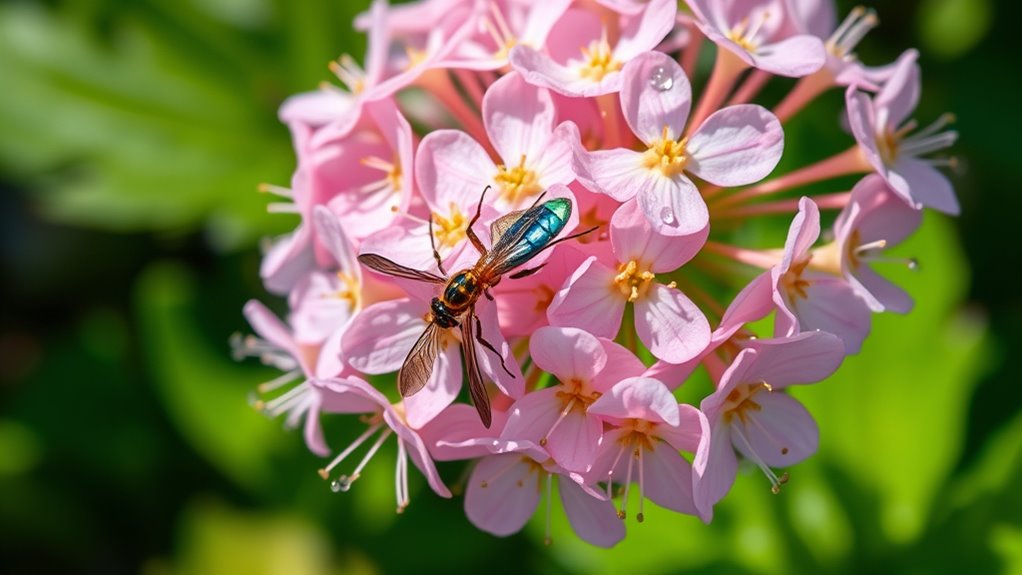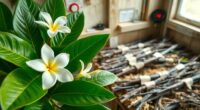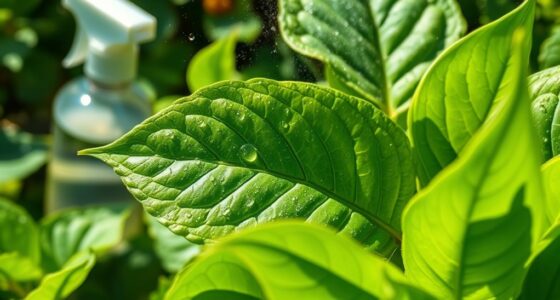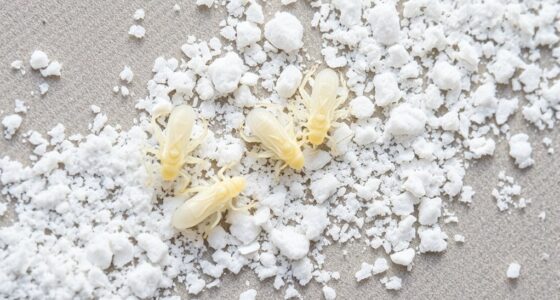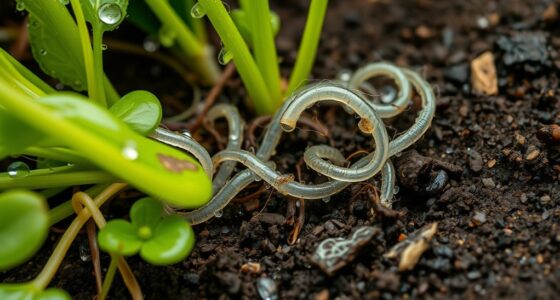To support parasitoid wasps and boost garden biodiversity, plant nectar-rich companions like yarrow, fennel, dill, sweet alyssum, cosmos, marigolds, sunflowers, and buckwheat. These flowers attract beneficial insects, including wasps and pollinators, while also deterring pests naturally. Strategically placing them in your garden creates a thriving habitat that strengthens natural pest control. For more tips on selecting the best companions, keep exploring how these plants work together to create a resilient ecosystem.
Key Takeaways
- Nectar-rich plants like yarrow, fennel, dill, and sweet alyssum attract parasitoid wasps and support pollinator activity.
- Marigolds emit scents and chemicals that repel pests and attract beneficial insects, including parasitoid wasps.
- Sunflowers provide habitat and attract pollinators that support parasitoid wasp populations.
- Companion plants such as buckwheat enhance biodiversity and attract natural enemies for pest control.
- Integrating diverse flowering plants fosters a resilient ecosystem that benefits parasitoid wasps and overall garden health.
Yarrow (Achillea Millefolium)
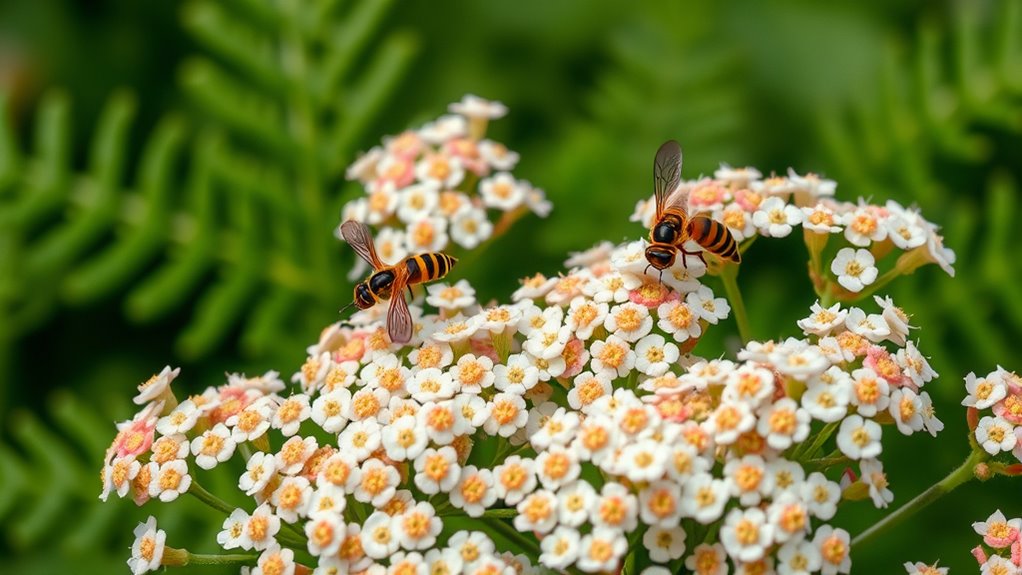
Yarrow (Achillea millefolium) is a versatile plant that benefits parasitoid wasps by providing essential nectar sources. Its medicinal properties have been valued for centuries, but it also plays a key role in supporting pollination. By attracting pollinators, yarrow helps ensure healthy flowering and seed production, which benefits the entire garden ecosystem. When you include yarrow in your landscape, you’re encouraging a diverse range of beneficial insects, including parasitoid wasps. These wasps help naturally control pest populations, reducing your need for chemical interventions. Furthermore, yarrow’s sturdy blooms offer a reliable source of nectar throughout the growing season. Its dual role in medicinal use and pollination support makes yarrow an excellent addition for fostering a balanced, pest-resistant garden. Using plants like yarrow that promote beneficial insects can significantly enhance the health and resilience of your garden.
Fennel (Foeniculum Vulgare)
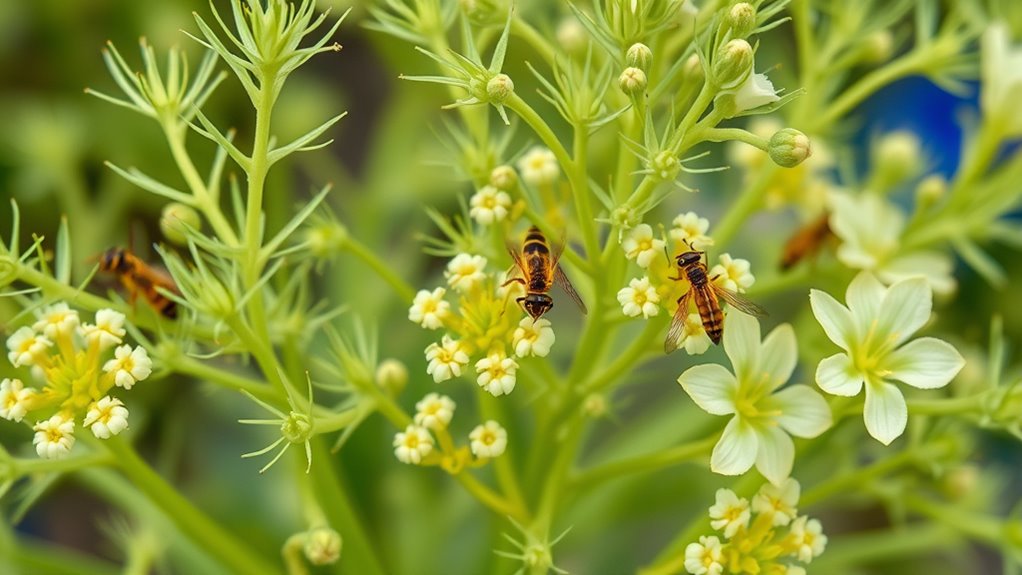
Fennel (Foeniculum vulgare) offers more than just culinary flavor; it also serves as an excellent companion plant for supporting parasitoid wasps. Its aromatic benefits attract these beneficial insects, helping manage pest populations naturally. By incorporating fennel into your garden, you create an environment that encourages parasitoid wasps to thrive, enhancing your overall pest control strategy. Fennel’s scent draws wasps in, making it a powerful ally in companion planting. To illustrate, here’s how fennel benefits your garden:
| Plant | Benefits | Attracted Insects |
|---|---|---|
| Fennel | Aromatic benefits, pest control | Parasitoid wasps, pollinators |
| Carrots | Improved growth, pest deterrent | Ladybugs, hoverflies |
| Dill | Supports beneficial insects | Parasitoid wasps |
| Nasturtium | Pest barrier, attracts pollinators | Hoverflies, bees |
Dill (Anethum Graveolens)
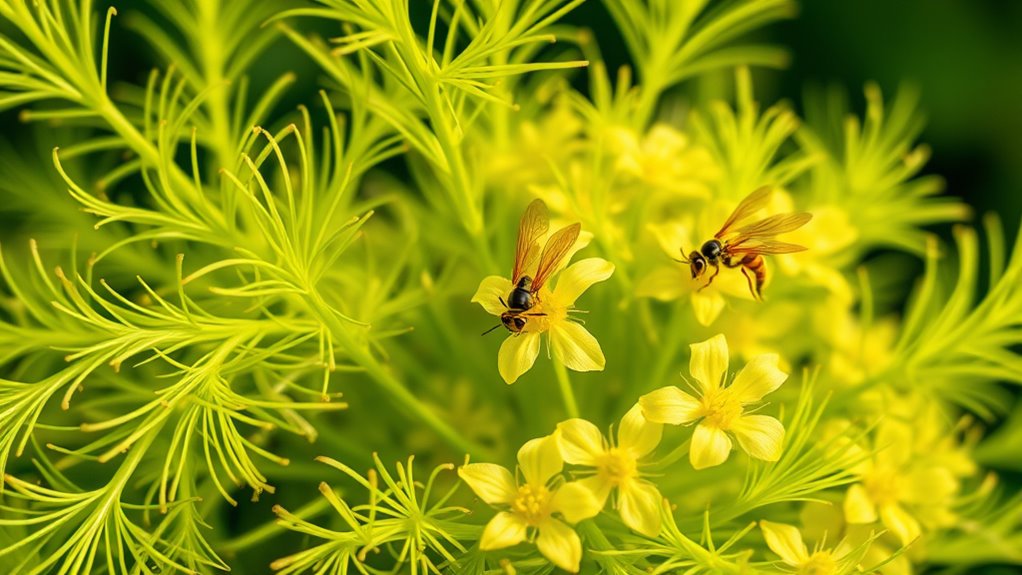
Dill (Anethum graveolens) is a valuable companion plant that actively attracts beneficial insects, including parasitoid wasps, to your garden. As part of herb companion planting, dill’s aromatic leaves and flowers draw pollinators and natural pest controllers alike. Using pollinator attraction strategies like planting dill near vegetables helps increase insect activity, which can reduce pest populations naturally. Dill’s open, umbels of tiny yellow flowers provide an ideal habitat for parasitoid wasps seeking hosts. By growing dill, you create an inviting environment that supports these beneficial insects, promoting a balanced ecosystem. Its presence not only enhances pollination but also encourages parasitoid wasps to stay and patrol for pests, making dill an essential element in your integrated pest management plan. Additionally, planting dill can contribute to a healthy garden ecosystem, supporting biodiversity and natural pest control efforts.
Sweet Alyssum (Lobularia Maritima)
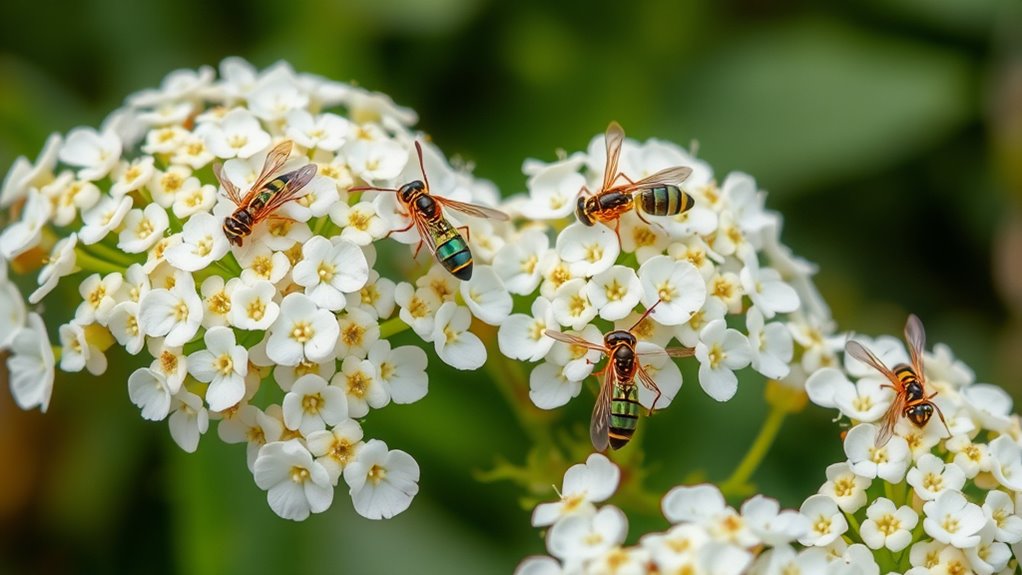
Sweet Alyssum attracts beneficial insects like parasitic wasps, helping control pests naturally. Its fragrant blooms boost garden biodiversity, creating a richer ecosystem. Plus, it supports the lifecycles of these helpful wasps, ensuring ongoing pest management.
Attracts Beneficial Insects
Sweet Alyssum (Lobularia maritima) is highly effective at attracting beneficial insects, especially pollinators and natural pest controllers. By drawing in these insects, it enhances pollination synergy, helping your plants produce better yields. Its fragrant flowers serve as an inviting habitat, encouraging a diverse range of beneficial insects to settle nearby. This habitat diversity guarantees a steady presence of pollinators and predators that keep pest populations in check. When you plant sweet alyssum, you’re creating an ecosystem that naturally supports healthy garden dynamics. The abundance of beneficial insects attracted to it not only boosts pollination but also helps control harmful pests, reducing your need for chemical interventions. Additionally, color accuracy in the flowers’ appearance can attract even more beneficial insects by making the flowers more visible and appealing. It’s a simple addition that promotes a balanced, thriving garden environment.
Enhances Garden Biodiversity
By planting Lobularia maritima, you actively promote greater garden biodiversity. Its dense, fragrant clusters attract a variety of pollinators, increasing pollinator diversity in your garden. This plant adds to habitat complexity, providing shelter and foraging opportunities for beneficial insects beyond parasitoid wasps. As a low-maintenance ground cover, it creates layered plantings that support different species and create a balanced ecosystem. The increased habitat complexity encourages natural pest control and supports a wider range of insects, birds, and other wildlife. Additionally, preppy dog names can inspire creative garden themes that complement your plantings. By diversifying plantings with sweet alyssum, you strengthen the ecological web in your garden, making it more resilient and vibrant. Ultimately, this fosters a healthier environment where beneficial insects thrive alongside your favorite plants.
Supports Parasitoid Lifecycles
Planting Lobularia maritima not only boosts garden biodiversity but also plays a crucial role in supporting the lifecycles of parasitoid wasps. These beneficial insects rely on parasitoid host plants to complete their development, and sweet alyssum provides an ideal habitat. Its abundant nectar resource diversity attracts adult wasps, offering essential energy sources. By offering continuous nectar flow, Lobularia maritima helps sustain wasps throughout their active periods, ensuring they remain effective at controlling pests. The diversity of nectar sources encourages a healthy, stable population of parasitoids, which in turn benefits your garden’s overall health. Incorporating sweet alyssum into your landscape creates a vital link in the natural pest control cycle, supporting the ongoing lifecycle needs of these important biological allies. Additionally, the presence of diverse plants like Lobularia maritima can enhance ecosystem resilience, promoting a balanced and thriving garden environment.
Cosmos (Cosmos Bipinnatus)
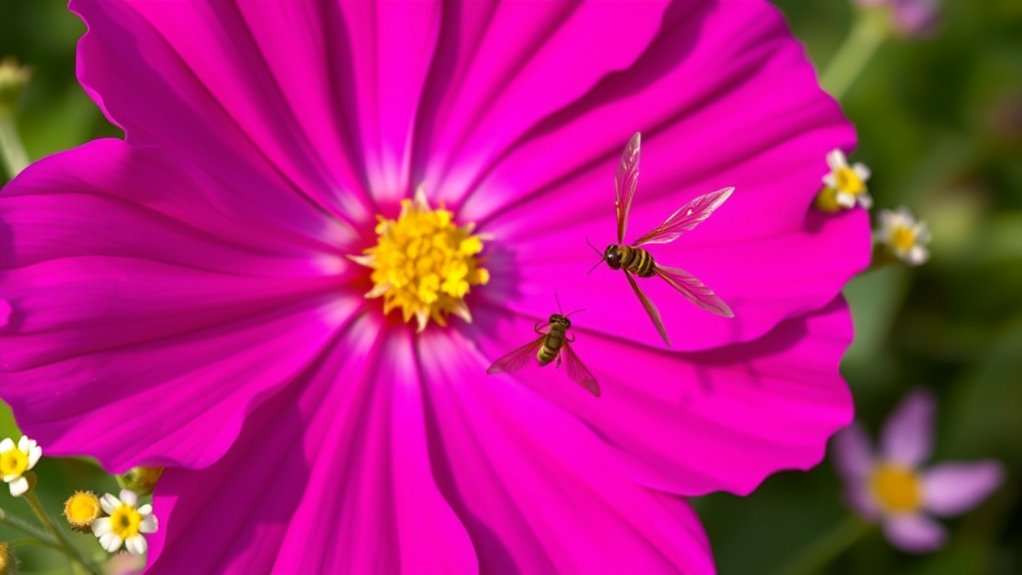
Cosmos (Cosmos bipinnatus) is an eye-catching annual flower that thrives in sunny gardens, making it an excellent companion plant for parasitoid wasps. Its vibrant blooms attract pollinators, helping to increase overall garden health. By incorporating cosmos into your planting scheme, you enhance pollinator attraction, which benefits beneficial insects like wasps. This plant is easy to grow and pairs well with other flowering companions, supporting natural pest control. Use the table below to see how cosmos fits into your companion planting strategy:
| Benefits | Ideal Growing Conditions | Partner Plants |
|---|---|---|
| Pollinator attraction | Full sun, well-drained soil | Marigolds, sunflowers |
| Supports biodiversity | Moderate watering | Zinnias, calendula |
| Easy to maintain | Warm temperatures | Lavender, daisies |
Marigolds (Tagetes Spp.)
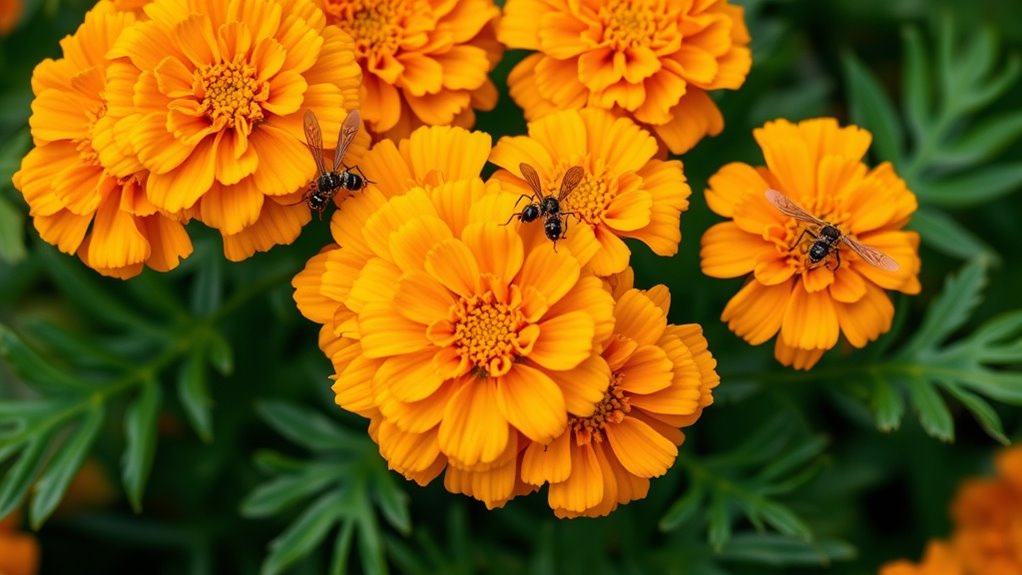
Marigolds (Tagetes Spp.) are excellent for deterring pests in your garden, thanks to their strong scent. They also attract beneficial insects like parasitoid wasps, which help control pest populations naturally. Additionally, planting marigolds boosts garden biodiversity by supporting a variety of helpful pollinators and predators. Unearthing the secrets of the supernatural realm, much like understanding natural ecological relationships, reveals hidden connections that underpin a balanced environment.
Pest Deterrence Properties
Because of their natural chemical defenses, marigolds (Tagetes spp.) are highly effective at deterring pest insects. Their strong scent and compounds like thiophenes repel common garden pests such as nematodes, aphids, and whiteflies. This makes marigolds a valuable tool in natural pest control, reducing the need for chemical pesticides. By using them in companion planting, you create a barrier that disrupts pest behavior and deters infestations before they start. Their pest-repellent properties not only protect nearby plants but also promote a healthier, more balanced garden ecosystem. Incorporating marigolds into your garden layout leverages their pest deterrence powers naturally, supporting sustainable gardening practices and minimizing harmful chemical use.
Attracting Beneficial Insects
By attracting beneficial insects, marigolds (Tagetes spp.) play a crucial role in natural pest management. They are excellent for companion planting, drawing in pollinators and predatory insects that help control pests. Marigolds produce nectar and scent profiles that attract hoverflies, lacewings, and parasitic wasps, which are natural enemies of many harmful insects. By planting marigolds strategically, you create insect habitats that support these beneficial species, encouraging a balanced ecosystem. These flowers serve as a food source and shelter, making your garden more inviting to helpful insects. Incorporating marigolds into your garden design boosts biological control, reducing the need for chemical interventions. Additionally, understanding the production quantity variance can help gardeners optimize plant growth and flowering times for better insect attraction. Overall, their presence enhances the diversity and resilience of your garden’s insect community.
Enhancing Garden Biodiversity
Integrating marigolds (Tagetes spp.) into your garden not only attracts beneficial insects but also considerably boosts overall biodiversity. These bright flowers enhance pollinator networks by providing nectar and pollen sources, supporting a variety of pollinators. They also increase habitat complexity, offering shelter and foraging sites that benefit a range of insects and small creatures. This diversity strengthens ecological resilience and promotes a balanced ecosystem. To visualize this, consider the table below showing how marigolds contribute:
| Benefit | Effect |
|---|---|
| Supports pollinator networks | Enhances insect interactions and pollination efficiency |
| Improves habitat complexity | Creates varied microhabitats for beneficial insects |
| Boosts biodiversity | Attracts a wide range of pollinators and natural enemies |
– Incorporating native plant species can further support local ecosystems and promote native insect populations.
Sunflowers (Helianthus Annuus)
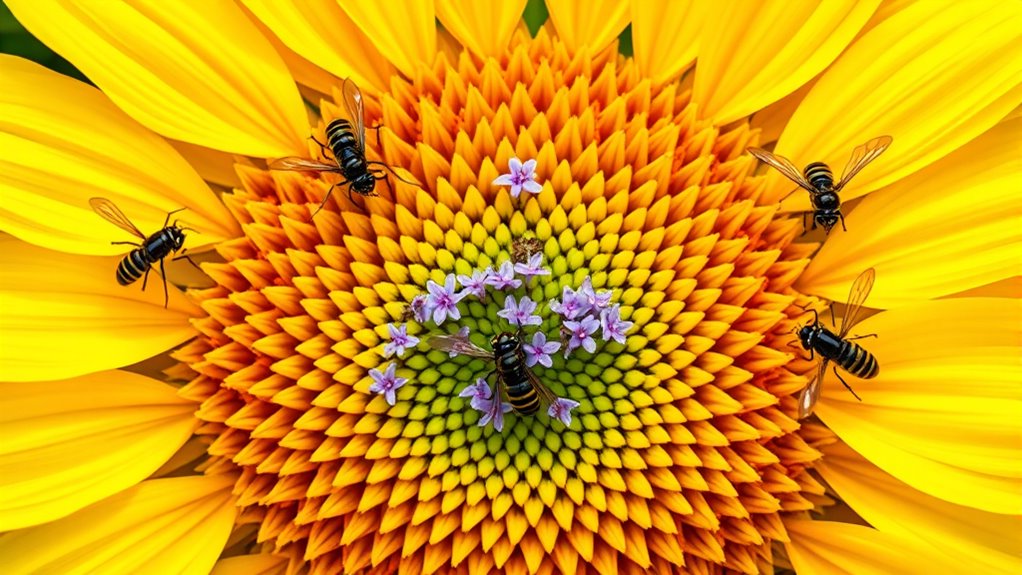
Sunflowers (Helianthus annuus) are a striking addition to gardens aimed at supporting parasitoid wasps, as their large, open flower heads provide an ideal landing platform and habitat. They attract a variety of pollinators, including bees and butterflies, which benefit from the abundant nectar and pollen. This pollinator attraction helps increase overall garden health and supports the ecosystem. Additionally, sunflowers play a key role in seed dispersal; their mature heads produce seeds that wildlife, such as birds, consume and spread across your garden. By planting sunflowers, you not only draw in beneficial insects but also promote natural seed distribution, enhancing biodiversity and creating a thriving environment for parasitoid wasps to flourish. Imagination mobilizes mental potential, allowing gardeners to envision vibrant, balanced ecosystems that support beneficial insects and promote ecological health.
Buckwheat (Fagopyrum Esculentum)
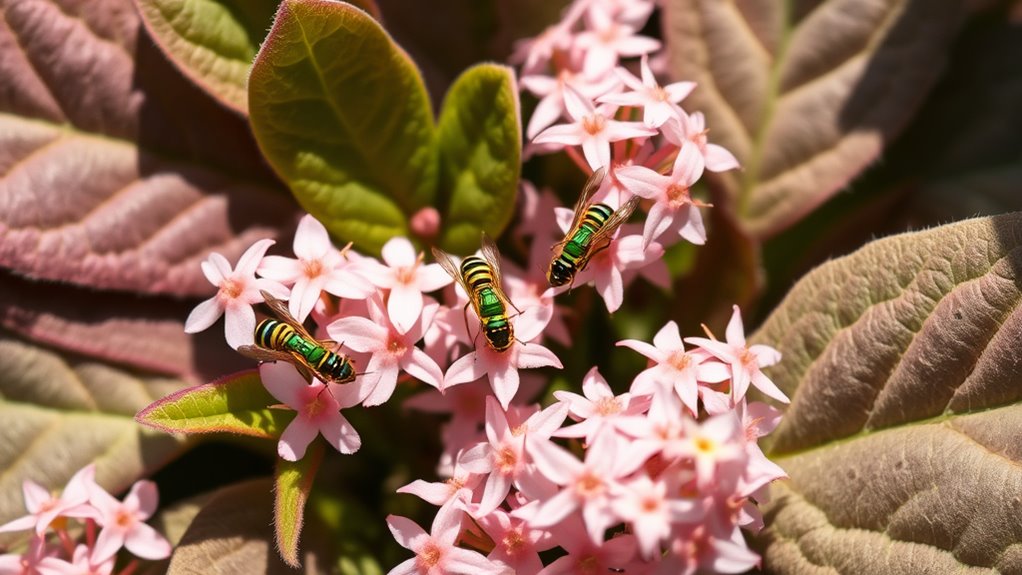
Buckwheat (Fagopyrum esculentum) is an excellent companion plant for attracting parasitoid wasps, thanks to its dense, nectar-rich flowers. Its vibrant blooms create a perfect pollinator habitat, encouraging beneficial insects to thrive. By planting buckwheat, you increase floral diversity, which supports a healthy ecosystem and natural pest control. The flowers attract wasps that hunt pests, helping protect your crops naturally. Plus, its quick growth means you’ll see benefits fast, making it a practical choice for gardeners. To visualize this, consider the table below, illustrating how buckwheat fosters a thriving pollinator habitat and enhances floral diversity:
| Benefits of Buckwheat | Impact on Pest Control |
|---|---|
| Attracts parasitoid wasps | Reduces pest populations |
| Supports pollinator habitat | Promotes plant health |
| Boosts floral diversity | Encourages ecosystem balance |
Additionally, the presence of diverse plant species like buckwheat can enhance biodiversity and contribute to a resilient garden environment.
Frequently Asked Questions
How Do Companion Flowers Attract Specific Parasitoid Wasps?
You can attract specific parasitoid wasps by planting companion flowers that emit unique volatile compounds and floral scents. These scents act as signals, guiding wasps to their preferred hosts. When you choose flowers that produce the right chemical cues, you’re effectively creating a beacon for these beneficial insects. This natural attraction helps control pests, promoting healthier plants and reducing the need for chemical pesticides.
Which Companion Flowers Are Most Effective for Different Pest Control?
When choosing companion flowers for pest control, focus on those that enhance pollinator attraction and match flowering timing with pest activity. Flowers like dill and fennel attract beneficial wasps early in the season, while marigolds and cosmos bloom later, supporting diverse parasitoid populations. You should select plants that provide continuous nectar sources, ensuring parasitoids stay active and effective against pests throughout the growing season.
Can Planting These Flowers Improve Overall Garden Biodiversity?
Imagine your garden bursting with vibrant blooms and buzzing life, creating a lively mosaic of color and sound. Planting these flowers boosts pollinator diversity and strengthens native plant resilience, turning your space into a thriving ecosystem. As pollinators flutter from flower to flower, they enhance plant health and productivity. This harmony supports beneficial insects like parasitoid wasps, ultimately improving your garden’s overall health and sustainability naturally.
Are There Any Drawbacks to Using Companion Flowers for Pest Management?
Using companion flowers for pest management can sometimes lead to drawbacks like increased pest resistance over time, making control harder. Additionally, there’s a risk of non-target effects, where beneficial insects or plants might be inadvertently harmed or affected. While these flowers support natural enemies like parasitoid wasps, you should monitor your garden closely to prevent potential negative impacts and guarantee the benefits outweigh the risks.
How Should These Flowers Be Integrated Into an Existing Garden Layout?
In the age of digital gardening, integrating these flowers into your garden is straightforward. You should plan garden bed placement carefully, ensuring they’re near crops needing pest control. Mix in seasonal flower rotation to keep parasitoid wasps active year-round. Plant companion flowers close to target plants, but avoid overcrowding, so beneficial insects can easily access them. This thoughtful layout enhances pest management naturally and maintains a vibrant, healthy garden.
Conclusion
So, next time you plant these flowers, remember they’re secretly working for the wasps you might want to avoid. While you enjoy the blooms, they’re inviting tiny allies to fight pests for you—kind of like a floral covert operation. It’s ironic how these charming blooms play such a sneaky role in pest control, isn’t it? So, go ahead, embrace the beauty and the hidden benefits—your garden’s little undercover heroes are already on duty.
